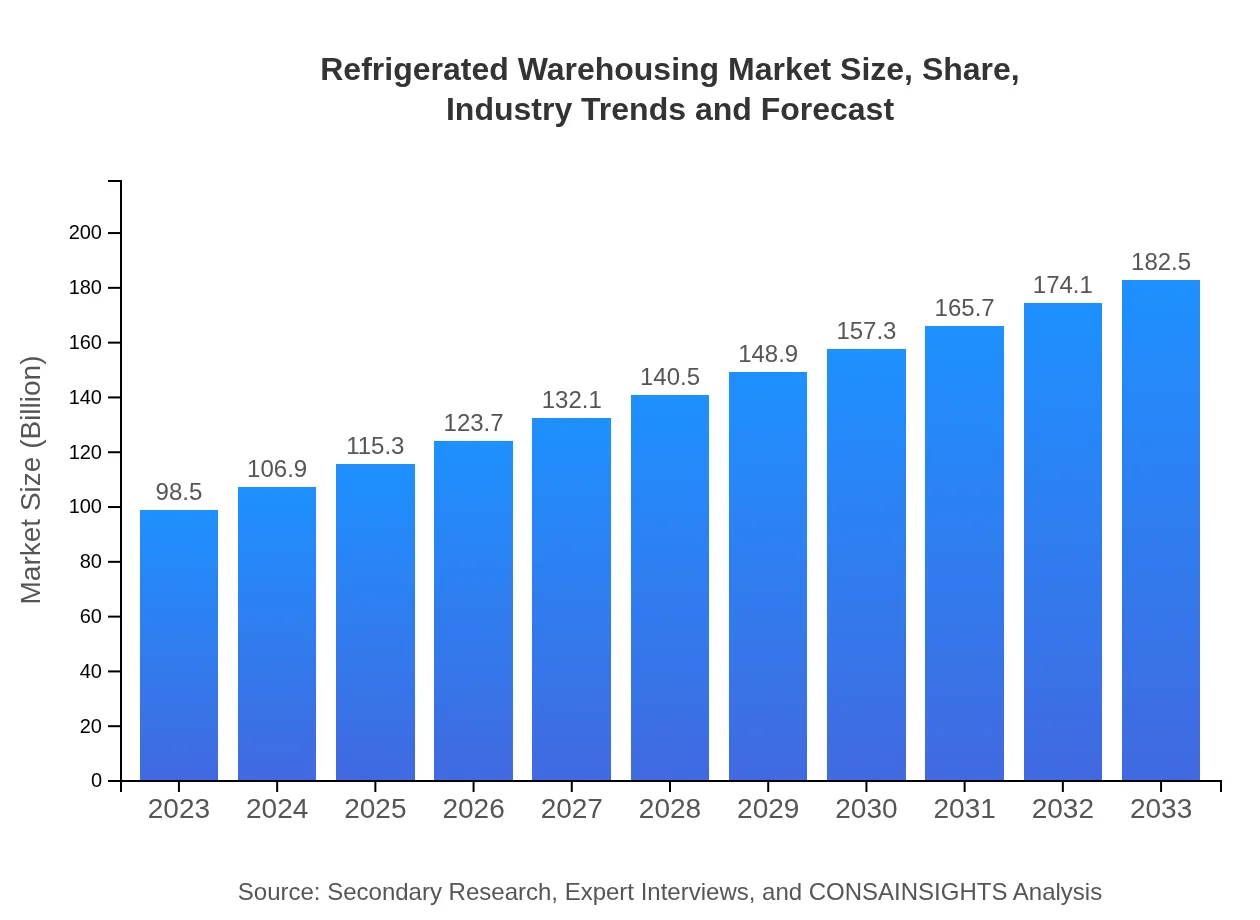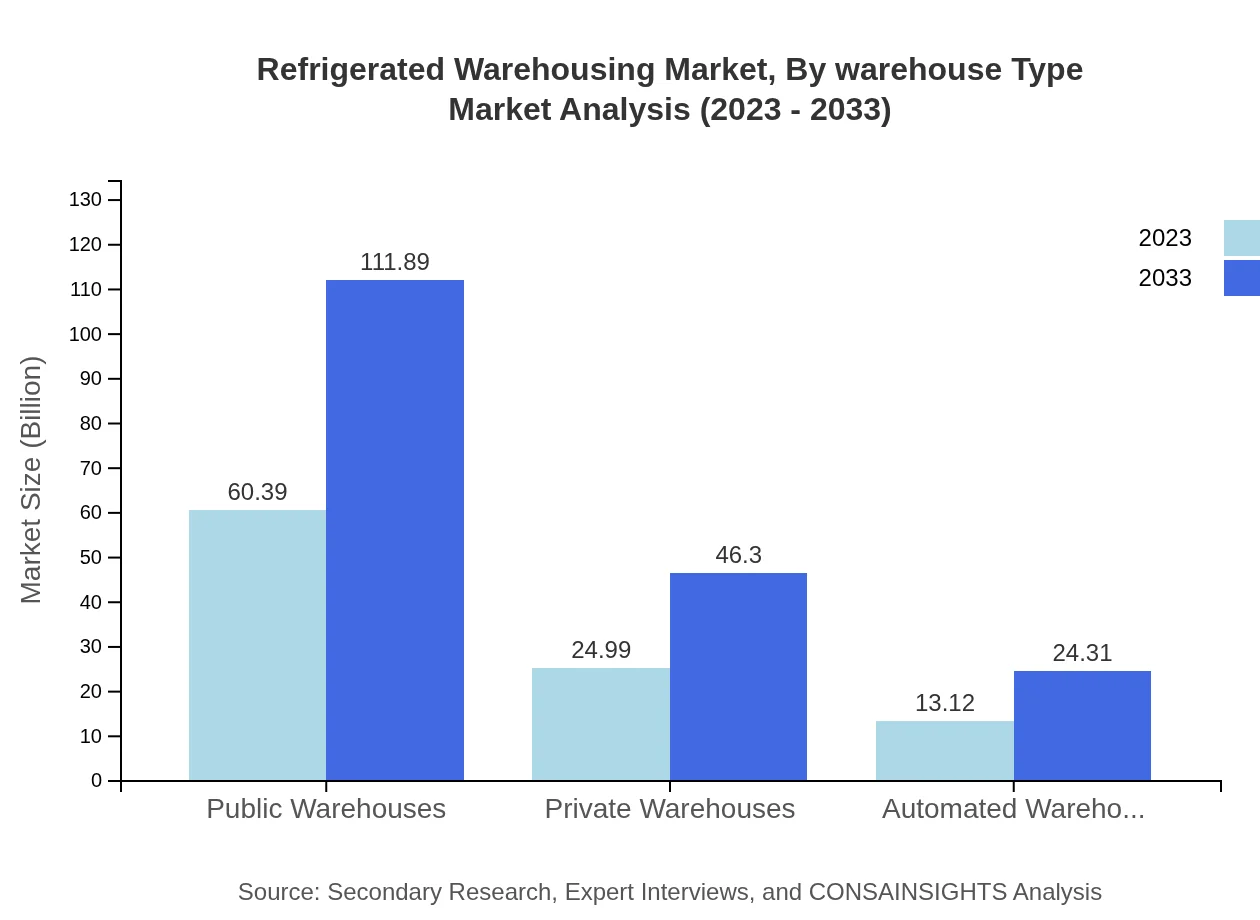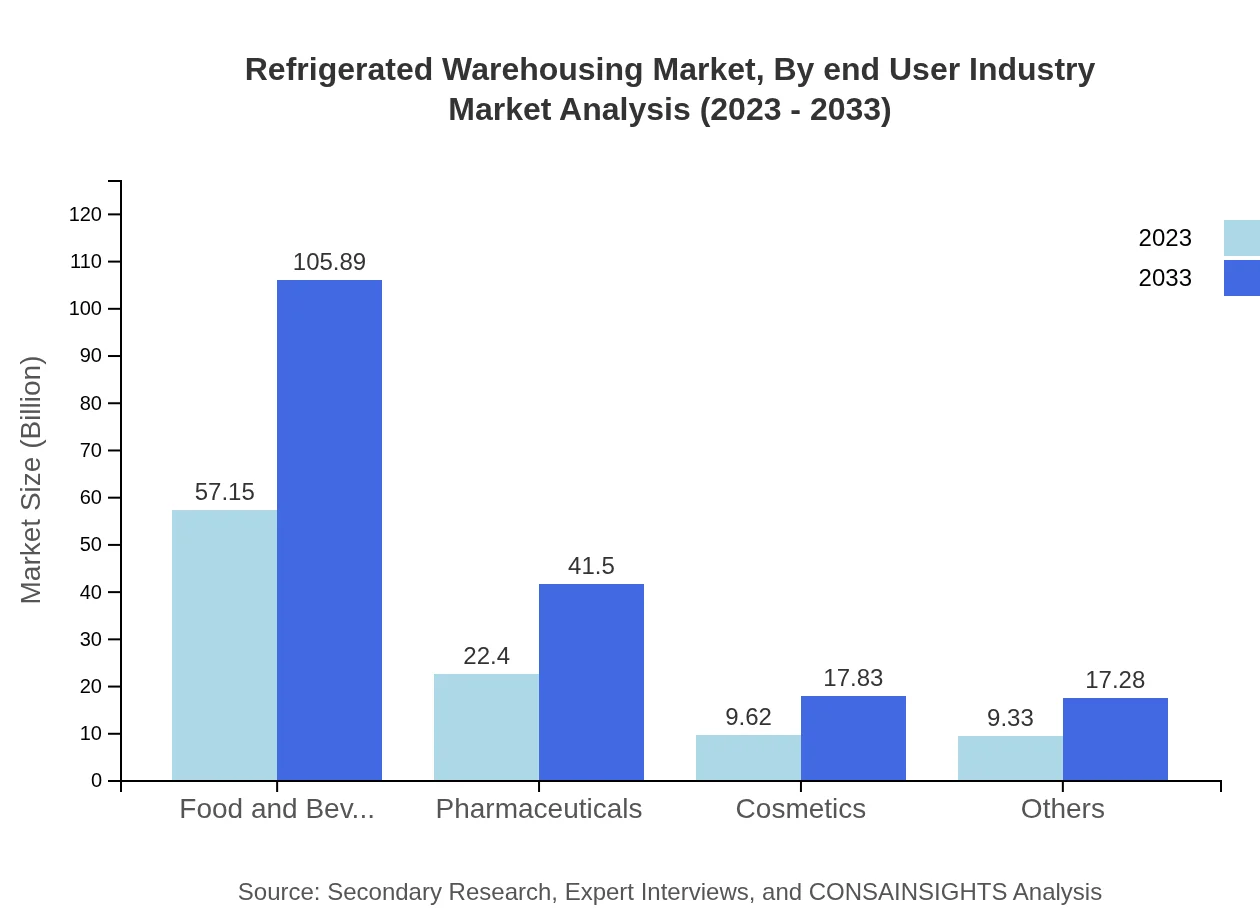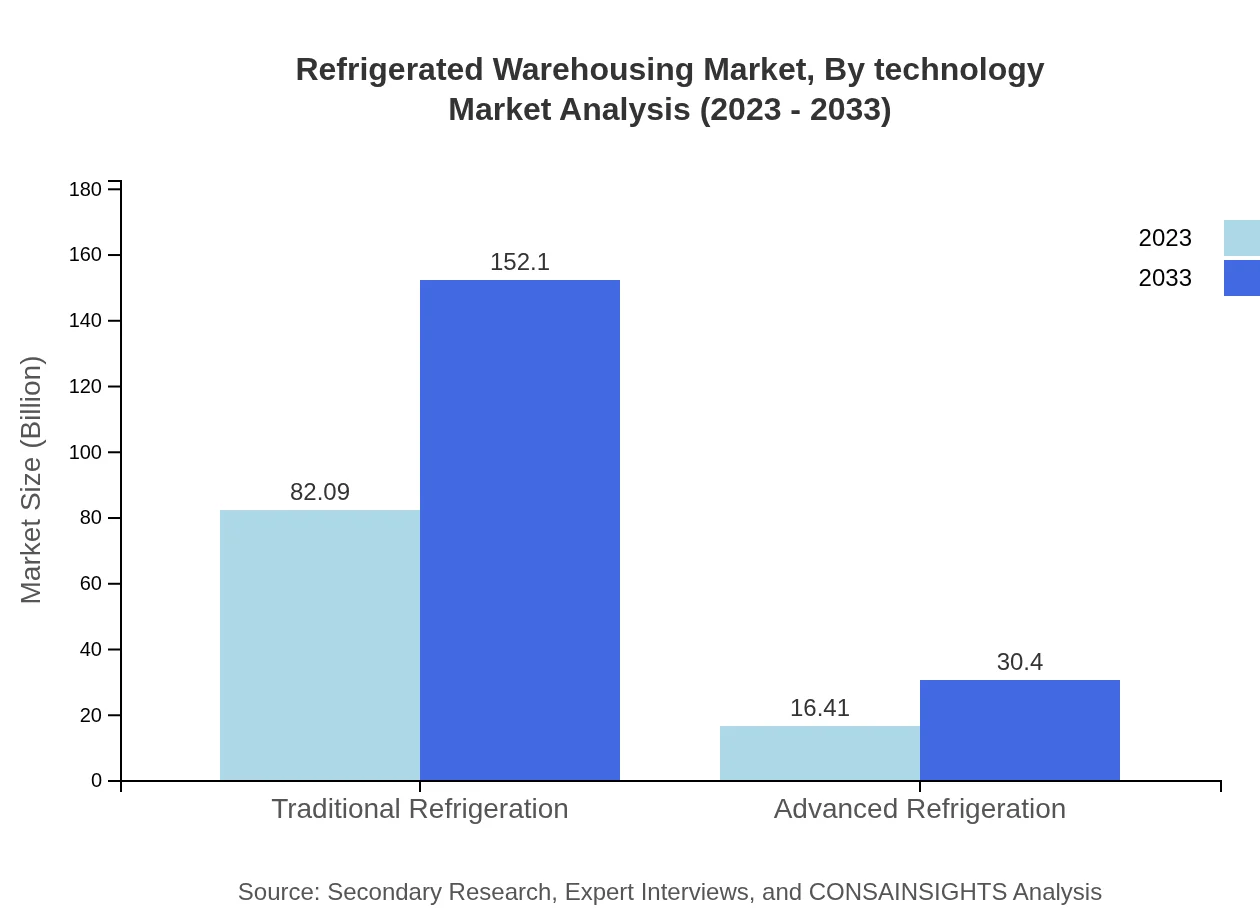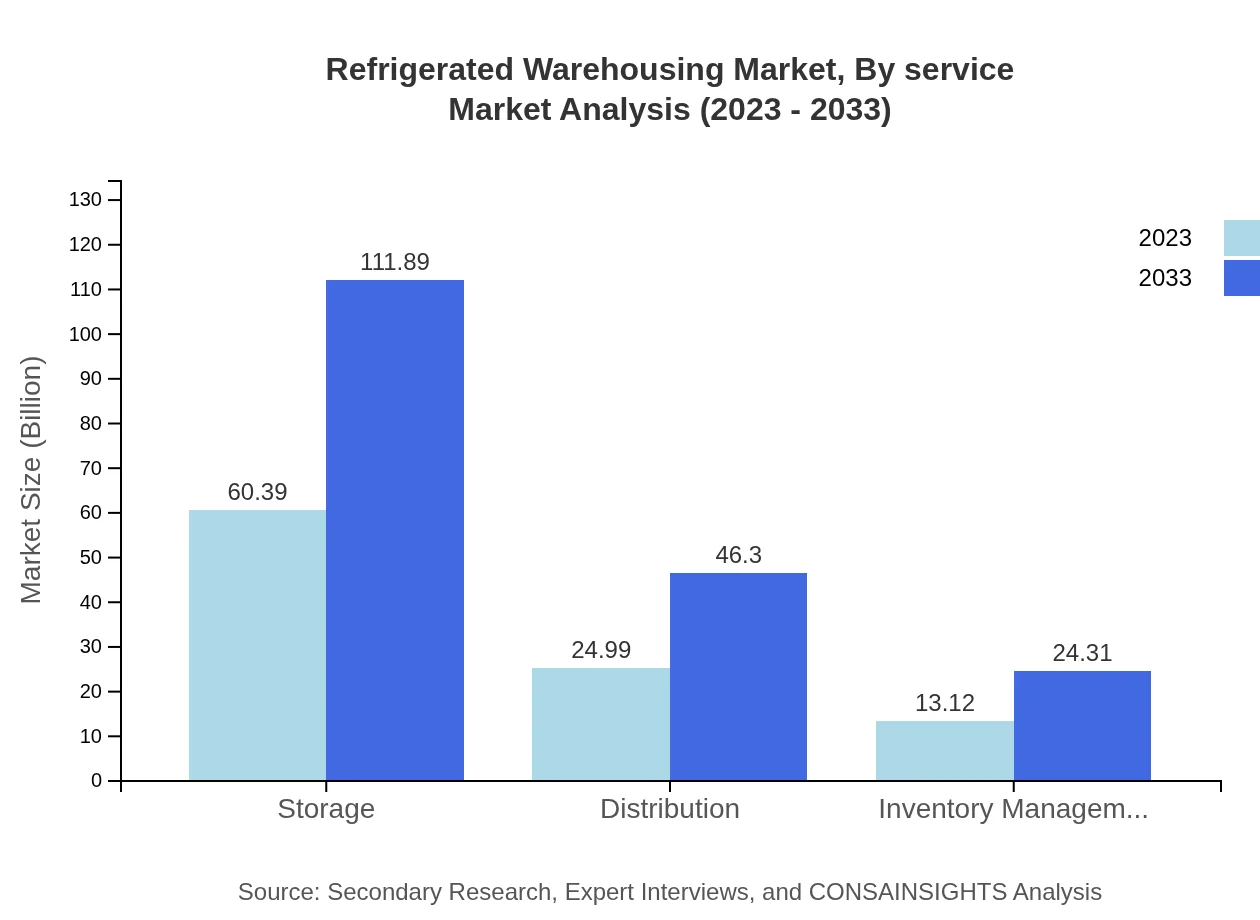Refrigerated Warehousing Market Report
Published Date: 02 February 2026 | Report Code: refrigerated-warehousing
Refrigerated Warehousing Market Size, Share, Industry Trends and Forecast to 2033
This report provides a comprehensive analysis of the Refrigerated Warehousing market, focusing on market trends, size, segmentation, and regional insights for the forecast period from 2023 to 2033, enabling stakeholders to make informed decisions.
| Metric | Value |
|---|---|
| Study Period | 2023 - 2033 |
| 2023 Market Size | $98.50 Billion |
| CAGR (2023-2033) | 6.2% |
| 2033 Market Size | $182.50 Billion |
| Top Companies | Americold, Lineage Logistics, SYSCO Corporation, KeHE Distributors |
| Last Modified Date | 02 February 2026 |
Refrigerated Warehousing Market Overview
Customize Refrigerated Warehousing Market Report market research report
- ✔ Get in-depth analysis of Refrigerated Warehousing market size, growth, and forecasts.
- ✔ Understand Refrigerated Warehousing's regional dynamics and industry-specific trends.
- ✔ Identify potential applications, end-user demand, and growth segments in Refrigerated Warehousing
What is the Market Size & CAGR of Refrigerated Warehousing market in 2023?
Refrigerated Warehousing Industry Analysis
Refrigerated Warehousing Market Segmentation and Scope
Tell us your focus area and get a customized research report.
Refrigerated Warehousing Market Analysis Report by Region
Europe Refrigerated Warehousing Market Report:
Europe's market is on track to grow from $25.55 billion in 2023 to $47.34 billion by 2033. Key factors include stringent food safety regulations and increasing demand for fresh produce.Asia Pacific Refrigerated Warehousing Market Report:
In Asia Pacific, the market is projected to grow from $20.80 billion in 2023 to $38.54 billion by 2033, influenced by rapid urbanization, population growth, and a rising demand for refrigerated food products.North America Refrigerated Warehousing Market Report:
North America holds a significant share, with market sizes anticipated to rise from $37.23 billion in 2023 to $68.98 billion by 2033, propelled by the booming e-commerce and retail sectors requiring enhanced cold chain logistics.South America Refrigerated Warehousing Market Report:
The South American market is expected to increase from $1.28 billion in 2023 to $2.37 billion by 2033. Growth is driven by an expanding middle class and increasing investments in agricultural exports.Middle East & Africa Refrigerated Warehousing Market Report:
The market in the Middle East and Africa is expected to surge from $13.63 billion in 2023 to $25.26 billion by 2033, driven by rising investments in the food and beverage industry and improved logistics infrastructure.Tell us your focus area and get a customized research report.
Refrigerated Warehousing Market Analysis By Warehouse Type
The segment consists of public warehouses, private warehouses, and automated warehouses. Public warehouses cover 61.31% of the market share in 2023, valued at $60.39 billion. Private warehouses represent 25.37% with a value of $24.99 billion. Automated warehouses are growing in importance, currently accounting for 13.32% of the market, valued at $13.12 billion.
Refrigerated Warehousing Market Analysis By End User Industry
The food and beverage sector leads the market, capturing a 58.02% share worth $57.15 billion in 2023, while pharmaceuticals represent 22.74% at $22.40 billion. Cosmetics account for 9.77% and other sectors constitute the remaining share, indicating varied demand across industries.
Refrigerated Warehousing Market Analysis By Technology
Traditional refrigeration leads with an 83.34% market share in 2023 at $82.09 billion. However, advanced refrigeration, currently at 16.66%, is gaining traction due to energy efficiency and environmental sustainability, expected to grow significantly in the coming years.
Refrigerated Warehousing Market Analysis By Service
Storage leads the segment with 61.31% market share in 2023 valued at $60.39 billion. Distribution services account for 25.37% at $24.99 billion, while inventory management covers the rest, indicating a concentrated focus on storage capacities within the industry.
Refrigerated Warehousing Market Analysis By Geography
Global Refrigerated Warehousing Market, By Geography Market Analysis (2023 - 2033)
Geographical segmentation aligns with market size insights. North America and Europe dominate the market, followed by Asia Pacific, illustrating the global demand for refrigerated facilities across regions.
Refrigerated Warehousing Market Trends and Future Forecast
Tell us your focus area and get a customized research report.
Global Market Leaders and Top Companies in Refrigerated Warehousing Industry
Americold:
Americold is a leading provider of temperature-controlled warehousing and logistics solutions, with a vast network of facilities in North America.Lineage Logistics:
Lineage Logistics is a global provider of temperature-controlled logistics solutions, specializing in food and beverage supply chains, and renowned for its advanced technologies.SYSCO Corporation:
SYSCO Corporation delivers foodservice products and warehousing solutions, leveraging its extensive distribution network to meet market needs.KeHE Distributors:
KeHE is a major distributor of natural and organic food products, providing comprehensive refrigerated warehousing capabilities to facilitate distribution.We're grateful to work with incredible clients.









FAQs
What is the market size of refrigerated warehousing?
The global refrigerated warehousing market is currently valued at approximately $98.5 billion, with a strong projected CAGR of 6.2%. By 2033, this market is expected to grow significantly, driven by increasing demand for temperature-sensitive goods.
What are the key market players or companies in the refrigerated warehousing industry?
Key players include prominent companies like Americold Realty Trust, Lineage Logistics, and United States Cold Storage. These companies lead in providing state-of-the-art refrigerated facilities, enhancing distribution and logistics for temperature-sensitive products.
What are the primary factors driving the growth in the refrigerated warehousing industry?
Growth drivers encompass increasing demand for fresh and frozen food items, expansion of e-commerce, and the rise of the pharmaceutical sector. Technological advancements in refrigeration and supply chain logistics are also pivotal in fostering market growth.
Which region is the fastest Growing in the refrigerated warehousing market?
North America currently leads the market, valued at $37.23 billion in 2023, and is projected to reach $68.98 billion by 2033. The Asia Pacific region follows, growing from $20.80 billion to $38.54 billion in the same period.
Does ConsaInsights provide customized market report data for the refrigerated warehousing industry?
Yes, ConsaInsights offers tailored market reports for the refrigerated warehousing industry. These reports can be customized to focus on specific segments, regions, or emerging trends based on client requirements and business strategies.
What deliverables can I expect from this refrigerated warehousing market research project?
Deliverables typically include in-depth market analysis, segment breakdown, regional insights, business intelligence data, growth forecasts, and competitive analysis. These components are designed to support strategic decision-making and investment planning.
What are the market trends of refrigerated warehousing?
Current trends highlight a shift towards advanced refrigeration technology, sustainable practices, and automation in warehousing operations. Additionally, the increased integration of IoT and data analytics in inventory management reflects a growing emphasis on supply chain efficiency.

